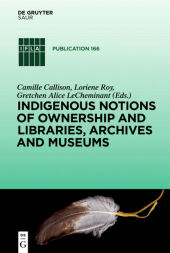 Neuerscheinungen 2016Stand: 2020-02-01 |
Schnellsuche
ISBN/Stichwort/Autor
|
Herderstraße 10
10625 Berlin
Tel.: 030 315 714 16
Fax 030 315 714 14
info@buchspektrum.de |

Camille Callison, Gretchen A. LeCheminant, Loriene Roy
(Beteiligte)
Indigenous Notions of Ownership and Libraries, Archives and Museums
Herausgegeben von Callison, Camille; Roy, Loriene; LeCheminant, Gretchen Alice
2016. XI, 376 S. 17 b/w ill., 8 b/w tbl. 230 mm
Verlag/Jahr: DE GRUYTER 2016
ISBN: 3-11-036299-6 (3110362996)
Neue ISBN: 978-3-11-036299-2 (9783110362992)
Preis und Lieferzeit: Bitte klicken
Die International Federation of Library Associations and Institutions (IFLA) ist der führende internationale Dachverband, der die Interessen von Bibliotheken und Informationsdiensten und ihren Nutzern vertritt. Sie ist das weltweite Sprachrohr der Bibliotheks- und Informationsberufe. In der Reihe IFLA Publications wird eine Vielzahl der Möglichkeiten diskutiert, wie Bibliotheken, Informationszentren sowie Angestellte in Informations- und Dokumentationsberufen weltweit ihre Ziele formulieren und ihren Einfluss als Gruppe wahrnehmen, ihre Interessen vertreten sowie Lösungen für globale Probleme entwickeln können.
The International Federation of Library Associations and Institutions (IFLA) is the leading international body representing the interests of library and information services and their users. It is the global voice of the information profession. The series IFLA Publications deals with many of the means through which libraries, information centres, and information professionals worldwide can formulate their goals, exert their influence as a group, protect their interests, and find solutions to global problems.
Tangible and intangible forms of indigenous knowledges and cultural expressions are often found in libraries, archives or museums. Often the "legal" copyright is not held by the indigenous people´s group from which the knowledge or cultural expression originates. Indigenous peoples regard unauthorized use of their cultural expressions as theft and believe that the true expression of that knowledge can only be sustained, transformed, and remain dynamic in its proper cultural context. Readers will begin to understand how to respect and preserve these ways of knowing while appreciating the cultural memory institutions´ attempts to transfer the knowledges to the next generation.
Camille Callison, Winnipeg, Canada; Loriene Roy und Gretchen Alice LeCheminant, Austin, USA.


